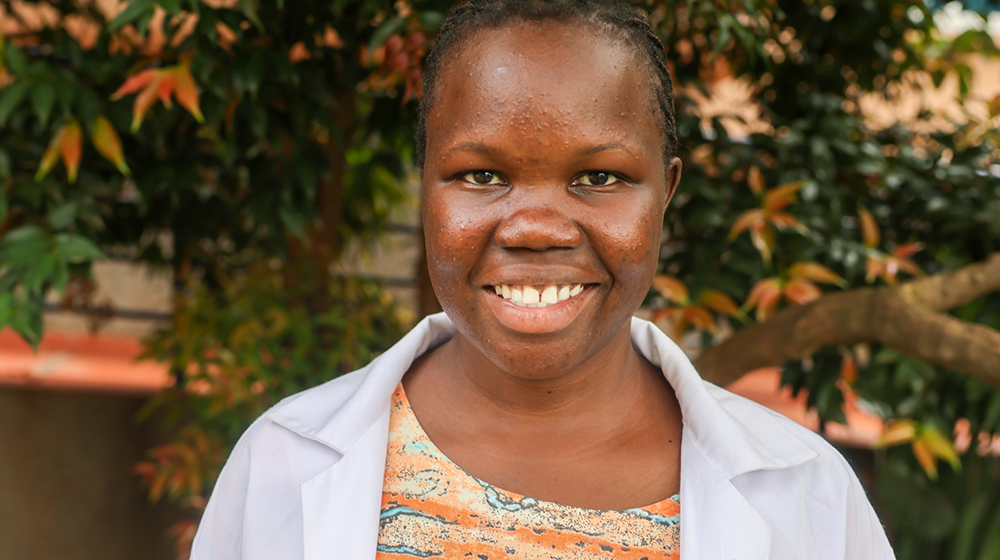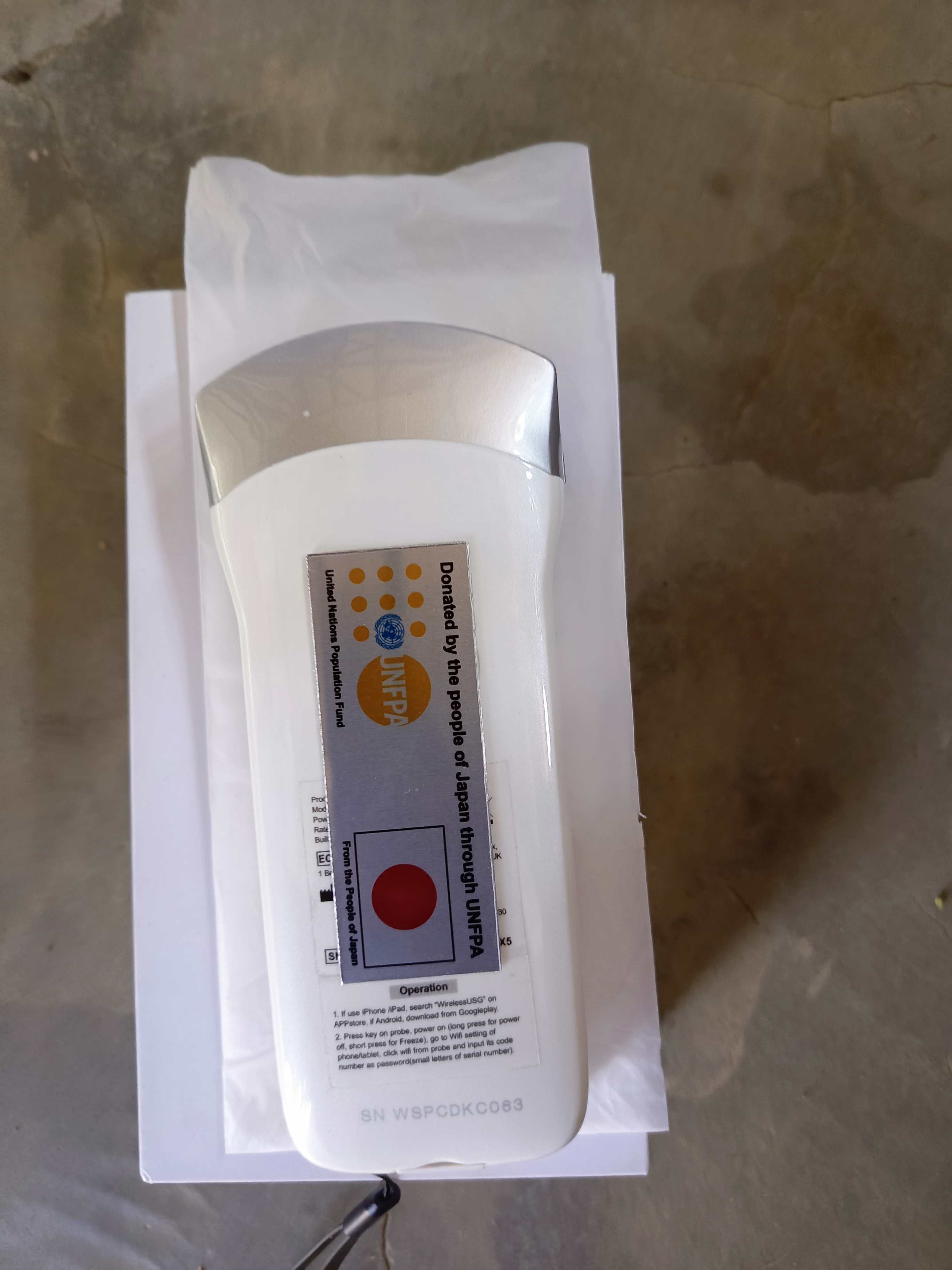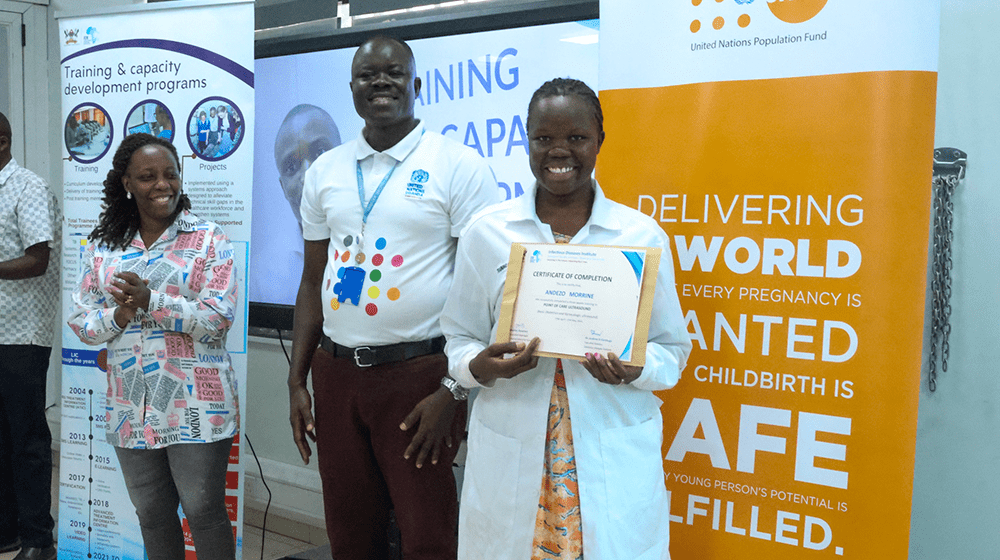Andezo Morrine is a registered midwife at Uriama Health Centre III, located within the Rhino Camp refugee settlement in Terego district, Uganda. Today, Morrine, and eight other midwives, have completed a three-week training on Point of Care Ultrasound (POCUS), an initiative introduced by UNFPA in collaboration with the Infectious Disease Institute of Makerere University. This training, designed to equip midwives with essential skills in obstetrics and gynecology, has been transformative for Morrine, who is the only government midwife at her facility.
A Midwife’s Passion

Morrine’s love for her work is evident in her face and demeanor. Alongside three other midwives, Morrine serves a community that primarily consists of refugees. Despite the challenges, her dedication to delivering quality care shines through. On average, she helps deliver five mothers a day, although the number can rise to six or seven. “We really deliver quality,” she proudly states.
Context of Refugees
Currently, Uganda is host to 1,644, 870 refugees, majority of whom are from South Sudan. Many are women and girls, some of whom are pregnant. Many pregnant women and girls often do not know their gestational age due to prolonged periods without medical care. When these women come to Uriama HC III, Morrine often encounters mothers who have no idea how far along they are in their pregnancies. This lack of information can complicate the provision of adequate care.
Impact of POCUS Training
The POCUS training, which Morrine attended as a student from Terego district, has been a game-changer. Morrine was sponsored by UNFPA through DELISiE– a project funded by the people of Japan through the Embassy of Japan in Uganda. Over three weeks, she learned the basics of obstetric and gynecological ultrasound. Reflecting on the training, Morrine says, “This training has given me a lot of knowledge, particularly in the field where I work and the setting where I am working. We have been referring mothers to HC IV or hospitals based on our assessment from a midwifery aspect. We have not been knowing what is happening in the uterus of the mother. Sometimes you may even make a wrong diagnosis.”
Transforming Maternal Care
With her new skills, Morrine can now scan mothers routinely during antenatal visits. This capability allows her to detect complications early, understand the baby’s position and identify multiple pregnancies, which are typically referred to larger facilities. “Now I am able to scan mothers routinely during antenatal, and if a mother who has been having a normal pregnancy develops complications, I can identify the issue and make an appropriate referral,” she explains.
The ability to perform basic scans is set to significantly reduce unnecessary referrals. “This scan will help us support mothers because sometimes when mothers take longer in labour, we may panic and refer them, yet they just need a few more hours to give birth,” Morrine notes. “But now, if we are able to see how the baby is presenting, we can support and reduce congestion in the hospitals.”
A Game-Changer in Refugee Settings

The portable ultrasound device, which operates via a smartphone, is particularly revolutionary in refugee settings. “When women who are refugees arrive in the country, they often do not even know the gestational age of the baby,” Morrine explains. “Being able to scan the mothers enables us to provide adequate and quality care. All a midwife needs is a smartphone!”
A Win-Win for All
Previously, scanning at Morrine’s facility was limited to Thursdays. With her new skills, she can scan most mothers throughout the week, ensuring that when the sonographer visits on Thursday, they can focus on the more complex cases. “It is a win-win!” she exclaims. This not only improves efficiency but also enhances the quality of care provided to the mothers.
Conclusion
Morrine’s story highlights the profound impact of UNFPA’s initiatives and the essential role of training in empowering healthcare professionals. Her dedication and newfound skills will undoubtedly contribute to better maternal outcomes in the refugee setting, bringing hope and improved health to the community she serves. Today, on World Refugee Day 2024, UNFPA Uganda joins the refugee community and stakeholders in Uganda to thank the people of Japan for their generous support toward women and girls in humanitarian settings to ensure safe births and a gender-based violence free world for every refugee woman and girl!
Story by Prisca Uwera Kalenzi


